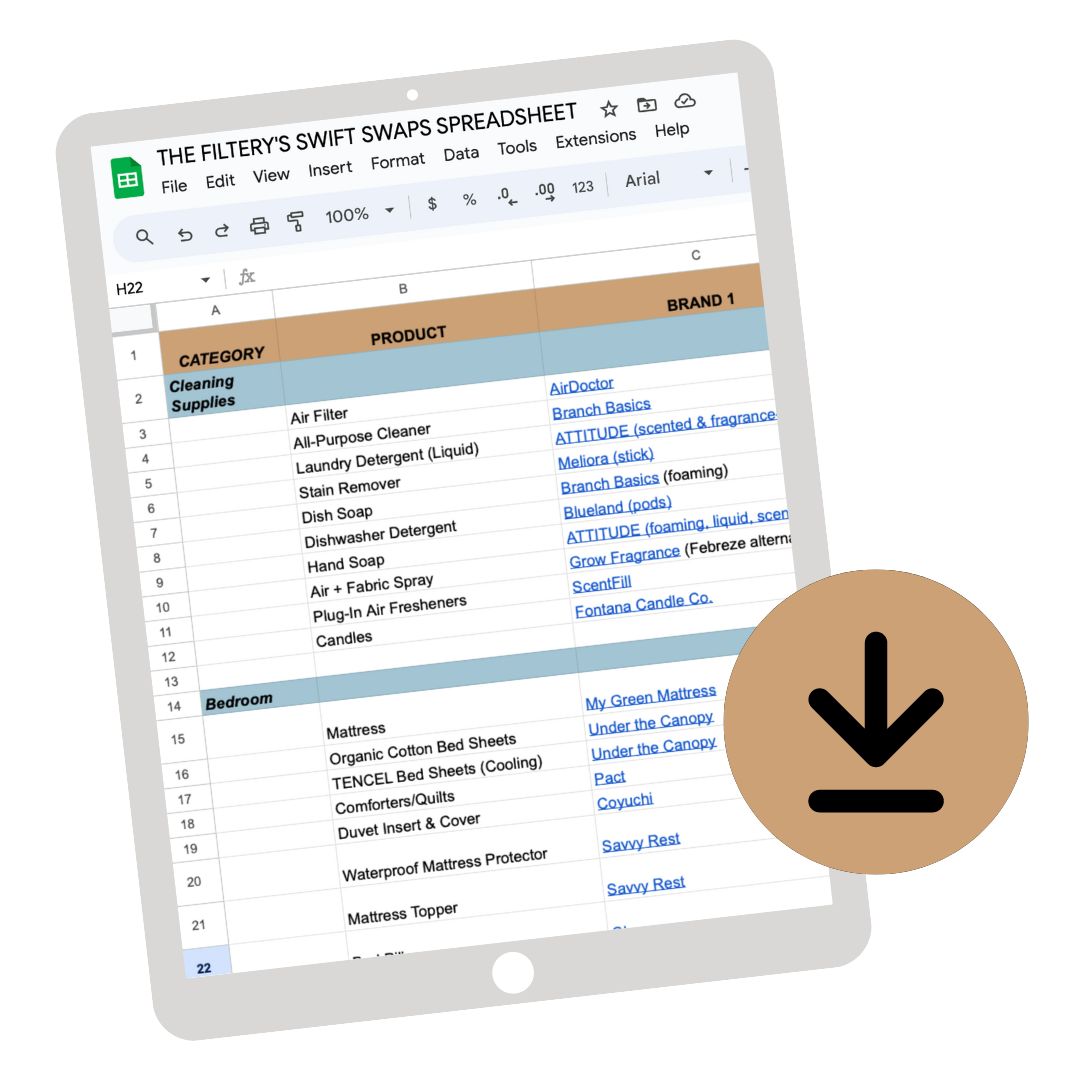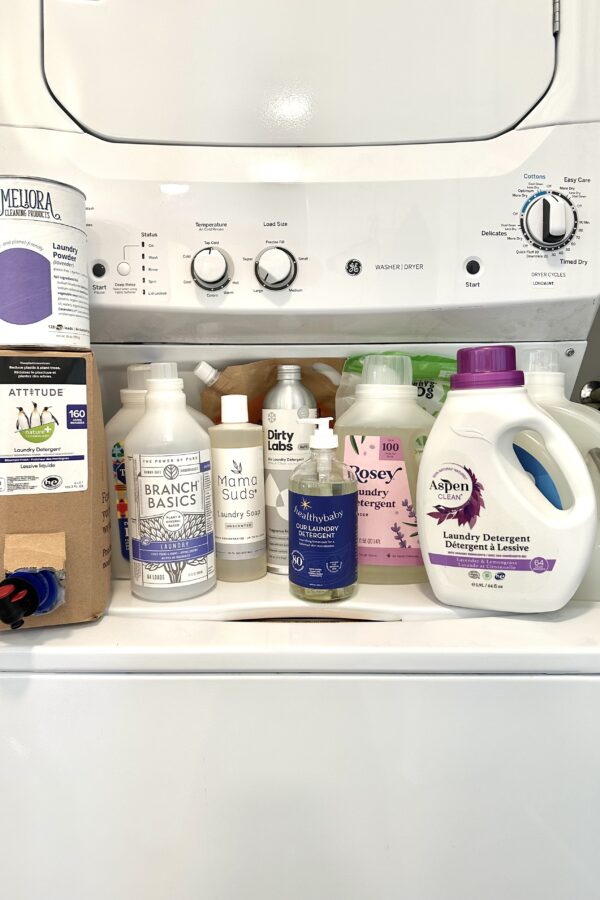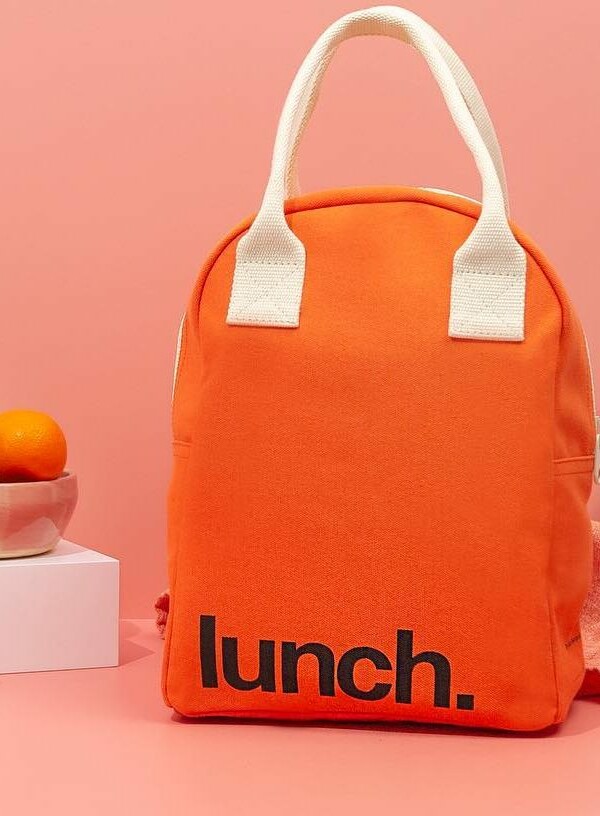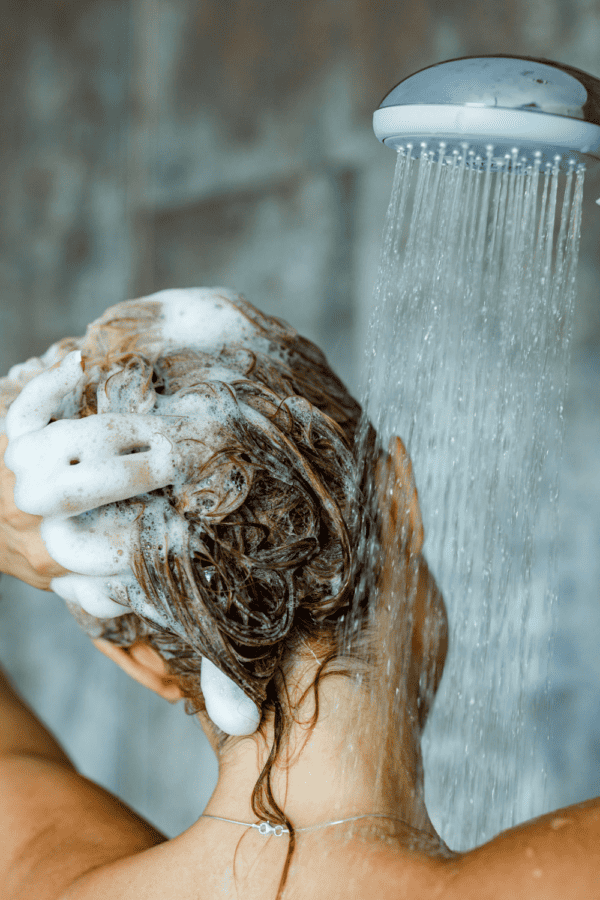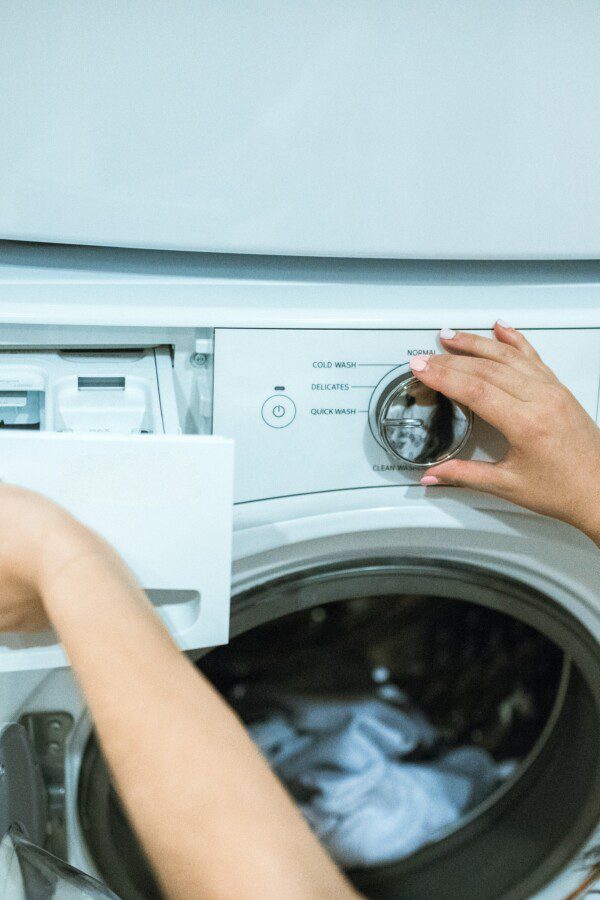9 Elements is a brand that popped up on the Target shelves a few years ago next to those other “green” cleaning goods companies like Mrs. Meyers, Seventh Generation, Method, Everspring, and Grove.
9 Elements is a minimalistic brand that utilizes a natural ingredient that people have been using to clean their homes for centuries: vinegar.
At least at first glance, 9 Elements’ products appear to be eco-friendly and non-toxic, but with so many cleaners and detergents being greenwashed these days, many consumers are skeptical!
So in this article, we’re going to talk about the ingredients in 9 Elements and whether or not they’re really safe, non-toxic, and sustainable. Then you’ll be able to decide for yourself whether or not you want to use 9 Elements to clean your home.
P.S. We tried and reviewed the effectiveness of 9 Elements’ products in a separate article, which you can check out here.
IN A NUTSHELL:
- 9 Elements is a laundry and home cleaning brand that’s owned by P&G and available at big box retailers.
- 9 Elements gets its name from the fact that all of their ingredient lists contain 9 ingredients or less. Many of those ingredients are natural and/or plant-based, while others are synthetic.
- There are pros and cons to 9 Elements’ products. They are free from many of the harsh chemicals used in other cleaning products, but they use a lot of plastic and they don’t have any fragrance-free options.
- Even though 9 Elements advertises vinegar as its star ingredient, it actually uses other ingredients to clean surfaces and soften water, and vinegar is found at the bottom of the ingredient list.
Table of Contents
- 9 Elements Products
- So, Is 9 Elements Really Safe & Non-Toxic? (Pros & Cons)
- The PROS:
- The Potential CONS:
- 1. Synthetic & ehtoxylated ingredients
- 2. No fragrance free options
- 3. Heavy on the plastic
- 4. Owned by P&G
- Is 9 Elements Greenwashing?
- 9 Elements Review
- Where Can You Buy 9 Elements?
- Some more FAQs About 9 Elements Products
This article contains affiliate links, which means we may earn a commission if you decide to make a purchase.
9 Elements Products
The story 9 Elements tells is that it was started by two scientists for the same reason a lot of non-toxic consumer brands are started: their families were experiencing mysterious health concerns, leading them to become more mindful about the chemicals in their environment and eventually start their own simple cleaning line.
9 Elements’ cleaning product collection currently includes:
- Multipurpose cleaning spray
- Liquid dish soap
- Dish spray
- Bathroom cleaner spray
- Laundry detergent
- “Purifying” fabric softener
They have three scents available: Lemon, Eucalyptus, and Lavender. (They do not offer fragrance-free options at this time.)
The star ingredient in 9 Elements’ products is vinegar, which is not only an effective cleaner, but it also helps prevent hard water buildup. (More on this point below.)
So, Is 9 Elements Really Safe & Non-Toxic? (Pros & Cons)
The truth is that many home and personal care products exist somewhere on a spectrum when it comes to ingredient safety. Many products are better than your more conventional options, but still have some drawbacks.
So let’s look at the pros and cons of 9 Elements so you can decide if their products are right for you and your family:
The PROS:
1. Short & transparent ingredient lists
The “9 Elements” name comes from the fact that all of their products contain only 9 ingredients or less. This is generally a good thing because it means there are less ingredients for consumers to try and sort through.
A long ingredient list doesn’t automatically mean something is toxic, and vice versa, but lots of complicated ingredients can lead to confusion and can leave more room for potentially problematic ingredients to go unnoticed by consumers.
With shorter ingredient lists, it’s generally easier for consumers to decide if it’s the right fit for them.
2. Free from many of the worst ingredients
9 Elements’ products are free from things like synthetic fragrances, artificial preservatives, dyes, thickeners, optical brighteners, and bleach.
Synthetic fragrances are where endocrine disruptors like phthalates are often hidden, so it’s a good thing you don’t have to worry about that with 9 Elements.


The Potential CONS:
1. Synthetic & ehtoxylated ingredients
Even though 9 Element’s formulations are relatively simple and free from a lot of the problematic ingredients found in other cleaning products, many conscious consumers and chemically-sensitive people still want to know if their products still use a lot of synthetic ingredients.
Of course, not all of those synthetics are “bad,” by any means! It’s mostly just something to be aware of if you’re looking for an “all-natural” cleaning product, because 9 Elements isn’t it.
The other thing to note is that 9 Elements does use several different ethoxylated ingredients. The concern with this type of ingredients comes from potential contamination during the manufacturing process. There are two main chemicals of concern that are used to process ethoxylated ingredients: 1,4 dioxane and ethylene oxide.
Ethylene oxide is an irritant that’s known to cause multiple types of cancer and infertility. And 1,4 dioxane is also a known carcinogen. These ingredients aren’t added intentionally (and therefore won’t be found on any ingredient labels), but they’ve been found as contaminants in personal care and cleaning products that contain ethoxylated ingredients.
Ethoxylated ingredients definitely are not the worst ingredients around, and they’re so widespread in consumer products that they’re practically impossible to avoid completely. But many consumers still want to be aware of them because of those contamination concerns. And there are cleaning products on the market that don’t use them (like Branch Basicsand Force of Nature), so many prefer to choose those instead when they can.
2. No fragrance free options
9 Elements does not have any unscented options that are suitable for chemically-sensitive people who may want to avoid all fragrances, even naturally-derived ones.
So if you prefer to go with fragrance-free cleaners and detergents, you’ll have to go with a different brand.
3. Heavy on the plastic
These days, there are a lot of cleaning brands that offer refillable options, concentrated formulas, glass containers, and other ways to decrease or even entirely eliminated plastic from the home cleaning process.
9 Elements is not one of those brands; they still use a lot of plastic packaging. The only semi-“refillable” option they have is the dish soap spray, which allows you to keep the spraying lid and just replace the bottom part of the bottle that holds the soap.
4. Owned by P&G
Many conscious consumers prefer to choose to buy from smaller brands when they can. Compared to huge corporations like P&G, smaller brands tend to have more oversight and control over their supply chains and ingredient sourcing.
There also tends to be a difference in the motivating factors behind smaller brands compared to corporations. Although it certainly wouldn’t be fair or accurate to say that “all corporations are bad” or that “all small businesses are good,” the reality is that smaller non-toxic and sustainable brands tend to be run by individuals who are at least in part motivated by a sense of care and responsibility for people and planet… But with massive corporations like P&G, the good intentions of individual employees tend to get lost and decisions end up coming down to a single motive of profit—even at the cost of human and/or environmental health.
P&G, like so many other mega-corporations, has faced plenty of controversy not only for their environmental practices and greenwashing, but also for things like child and forced labor (by their palm oil supplier), animal testing, exorbitant CEO-to-worker pay ratios, and more.
At the end of the day, you’ll have to decide for yourself whether or not you want to buy P&G’s products.
RELATED: The Best Brands for Non-Toxic & Natural Cleaning Products

Is 9 Elements Greenwashing?
On one hand, 9 Elements is better than most of the other conventional cleaning products on the market when it comes to ingredient safety.
On the other hand, it has it’s downsides. It advertises itself as a vinegar-powered product line, which could potentially lead customers to think the formulations are just as simple and harmless as a DIY vinegar solution you’d make yourself… when that isn’t exactly the case.
Most people are aware that using vinegar to clean surfaces and fabrics is a good way to combat hard water stains on faucets, dishes, fabrics, and other surfaces, while at the same time getting rid of everyday dirt and grime. This is the idea that 9 Elements’ branding is based on. Right on the front of the 9 Elements homepage, it says: “Vinegar-Powered Laundry & Home Cleaning.”
But then if you go to the “How It Works” section of their website, you’ll find info about how “vinegar alone isn’t powerful enough” and how it would take five cups of vinegar to do the work of one cap of 9 Elements detergent. That’s why they’ve added other chemicals “to give you the effective clean you’re looking for.”
Then when you take a closer look at the ingredient lists on 9 Elements’ products, you see that vinegar is the last or second to last ingredient on the list… They don’t even use that much of it! Instead, they’re using other ingredients as cleaning and water softening agents. (Most of these ingredients aren’t necessarily “bad,” but the point is that it’s not really vinegar that’s doing the cleaning.)
So basically: it appears that 9 Elements is advertising the “power of vinegar” (perhaps in the hopes of appealing to DIY types who like to clean their homes with natural ingredients?), but in reality they’re not using all that much vinegar in their product formulations, and in fact, they’re using other cleaning agents and water softening ingredients to do the job instead.
You can decide for yourself whether this seems like greenwashing or not!

PROS:
- Short ingredient list
- Free from the “worst” ingredients, such as phthalates
- Available at a lot of big retailers
CONS:
- Doesn’t have any fragrance-free options
- Lots of plastic
- Owned by P&G
- More expensive than many other brands
- Advertises “vinegar-powered” when actually uses other ingredients to clean and soften water
9 Elements Review
You might be thinking: ‘All of this info is great, but do their products actually work!?’ We tried out their products and you can check out our thoughts here.
Home
9 Elements Review (Do Their Cleaning Products Work?)
I tried 9 Elements’ laundry detergent, multi-purpose cleaner, and dish spray. I’m sharing my thoughts so you can decide if you want to try it for yourself.
Where Can You Buy 9 Elements?
You cannot currently buy 9 Elements products directly from their website (although they say you’ll be able to soon), but you can buy it online and in stores from these retailers:
9 Elements is currently only available for sale in the 48 contiguous U.S. states.

Some more FAQs About 9 Elements Products
Does it smell like vinegar?
Even though 9 Elements cleaners have a slight hint of vinegar, it’s not overpowering and it doesn’t stick around. The formulations aren’t super heavy on the vinegar, and it’s largely covered up by the essential oils.
Is 9 Elements biodegradable?
Although they’re is made with some plant-based and biodegradable ingredients, 9 Elements products as a whole are not explicitly biodegradable.
Is 9 Elements vegan and/or cruelty-free?
It’s unclear. 9 Elements does not make any statements on their website about whether or not their products are vegan and/or cruelty-free. We’ve reached out to them to ask and will update if and when we receive a response. You can read about P&G’s cruelty-free statement here.
Is 9 Elements a disinfectant?
No, 9 Elements’ cleaners and detergents are soaps, not disinfectants. This means they wash away dirt and germs as opposed to killing them.
Is 9 Elements septic safe?
Yes, 9 Elements states that all of their products are safe for septic systems “when used as directed.”
Is 9 Elements Laundry Detergent HE Machine Suitable?
Yes, both the 9 Elements laundry detergent and fabric softener can be used with all types of washing machines, including high efficiency (HE) machines.
Who Owns 9 Elements?
9 Elements is owned by P&G.
Although it’s not clear, it appears that it was originally founded by P&G (as opposed to being started independently and then acquired.
